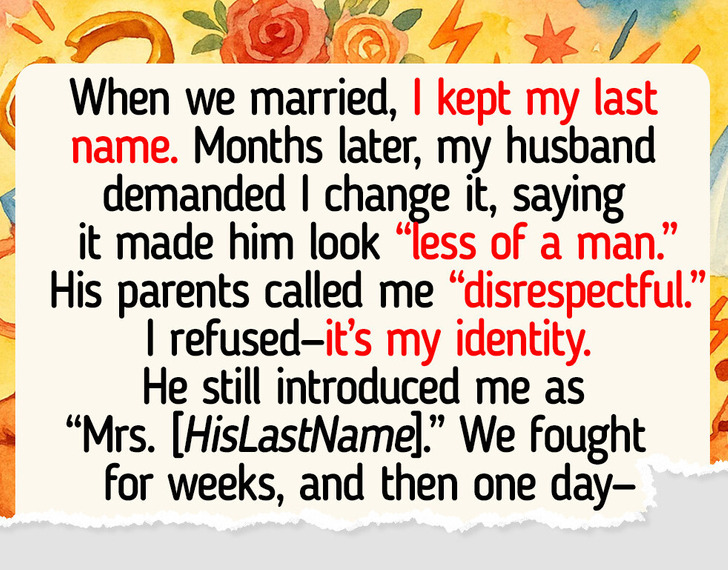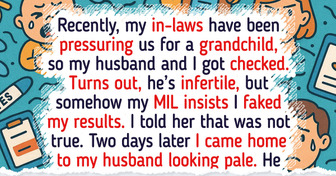I Told My Son His Girlfriend Can’t Live With Us If She Doesn’t Contribute, It Backfired on Me


Names carry weight. They hold our history, our identity, and the stories of those who came before us. One of our readers shared her powerful experience of standing her ground after marriage. When she refused to take her husband’s last name, it wasn’t about rebellion — it was about reminding everyone that love should never mean ownership.
Dear Bright Side,
When we got married, I kept my last name. My husband never mentioned an issue until months later, when he suddenly demanded I change it. He said it made him look “less of a man” and his parents backed him up, calling me “disrespectful.”
I told him my name is tied to my career and identity — I wasn’t giving it up. That’s when things shifted. He started introducing me as “Mrs. [HisLastName]” anyway, even at work events. When I corrected him, he got cold, saying I was “humiliating” him.
We fought for weeks. Finally, I told him: “If my last name matters more to you than our marriage, then maybe you don’t want a wife — you want control.”
We’re still together, but the truth is, the name fight exposed something deeper. It wasn’t just about tradition — it was about respect. And I’m not sure he sees the difference.
What should I do?

It’s been more than 50 years since women won the legal right to keep their own last names after marriage. Yet even today, most brides still give up theirs. According to a 2023 Pew survey, 4 out of 5 women who marry men adopt their husband’s last name.
So why does this tradition remain so powerful?
Experts point to history. For centuries, a wife’s identity was legally tied to her husband. Until the 1970s, some women couldn’t even open bank accounts or get official documents unless they took his name. Activists challenged those rules, and for a while, more women kept their names.
Sociologist Suzanna Danuta Walters explains that many young women today recognize the roots of the practice, but still go along with it. Some say it feels simpler, others want the same last name as their children, and sometimes the husband expects it.
What’s rarely considered? The opposite scenario. Pew reports that 92% of men keep their own last name, and only 5% ever take their wife’s. Walters says that’s because many still see it as “emasculating.” In her words: “We’ve had hundreds of years of women taking their husband’s name — why don’t we have hundreds of years of men doing the same?”
While some couples hyphenate or create new names, they remain rare exceptions. And that’s why this choice, which might seem small, still carries so much meaning. Walters puts it simply: If a name is enough to “rock the boat,” what does that say about the bigger inequalities we’re still not willing to touch?
Here are some psychological tips (with evidence) on how to say you refuse to take your husband’s surname — done in a way that helps protect your identity, reduce conflict, and keep your self-esteem strong:
✨ 1. Remember: Your Name Is Part of You
Psychologists say our names are tightly linked to our identity and self-worth. Changing it can feel like losing a piece of yourself. So when you explain your choice, focus on authenticity: “This name carries my story, and I want to keep it.”
✨ 2. Recognize Social Pressure for What It Is
Research shows many women change their surname not because they want to, but because tradition expects it. Naming the pressure out loud can be powerful: “I know tradition leans this way, but it doesn’t feel right for me.”
✨ 3. Think Practically About Your Career
Your last name might appear on your degree, your publications, or even your social media brand. Experts say consistency matters, especially professionally. Framing your choice as practical — not rebellious — often helps: “Keeping my name makes sense for my career.”
✨ 4. Use Boundaries, Not Apologies
Healthy relationships allow for boundaries. Assertive “I” statements help you avoid conflict while protecting your choice. Try: “I feel more like myself keeping my name, and it’s important to me.”
✨ 5. Stay Consistent — Even If It’s Uncomfortable
When people expect you to change, but you don’t, they may react with frustration. Psychologists call this “cognitive dissonance”. But staying calm and repeating your reasons shows strength and prevents back-and-forth arguments.

For some, changing a last name after marriage feels like a natural tradition. For others, keeping their maiden name feels like the right way to hold on to identity and independence. Both choices come with benefits and challenges. If you’re weighing the options, here are some downsides — and upsides — to consider.
🚩 The Disadvantages of Keeping Your Maiden Name
1. Confusion in Social Settings
Different last names can spark awkward questions. At school meetings, family events, or even introductions at a dinner party, people may assume you and your partner aren’t married. It’s not a dealbreaker, but it can get tiring to explain.
2. Extra Paperwork and Proof
Traveling with your spouse? Filing joint taxes? When your last names don’t match, you may be asked to show a marriage certificate. It’s a small thing, but it adds one more document to carry or process to complete.
3. Questions About Children’s Names
When kids come along, the surname conversation can get complicated. Whose last name do they take? Will you hyphenate? Teachers, doctors, and even relatives may get confused if the names don’t line up.
4. Perceptions of “Less Unity”
Some people see a shared surname as a symbol of family unity. If you keep yours, you might face judgment or unsolicited opinions — even though the strength of a marriage has little to do with names.
5. Occasional Career Confusion
If you keep your maiden name, colleagues or clients might not realize you’re married. This usually isn’t a big deal, but you may find yourself clarifying your status more than you’d like.
🌟 The Benefits of Keeping Your Maiden Name
1. Holding Onto Your Identity
Your name is part of your story. Keeping it can feel empowering, like you’re honoring your individuality and the life you’ve built.
2. Protecting Your Professional Reputation
If you’ve built a career under your maiden name, keeping it avoids confusion and ensures your work remains tied to you.
3. Dodging the Paperwork Pile
Changing your name means updating IDs, bank accounts, and official records. Keeping your surname saves hours of paperwork.
4. Honoring Family and Culture
Sometimes a surname carries cultural meaning or family heritage. Keeping yours is one way to keep that legacy alive.
5. Avoiding Post-Divorce Hassles
No one walks into marriage planning for divorce — but if it happens, switching names back can be another emotional and legal headache. Keeping your maiden name sidesteps that altogether.
Whether you change your last name or not, the choice is deeply personal. There’s no “right” answer — only what feels right for you, your identity, and your future.
15+ Wedding Stories That Are Both Hilarious and a Little Tragic











